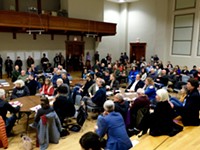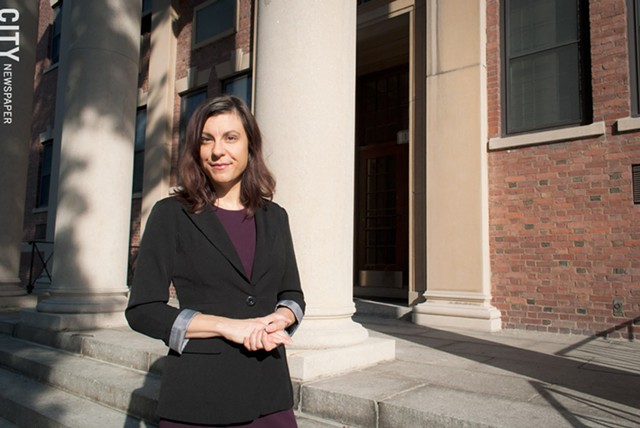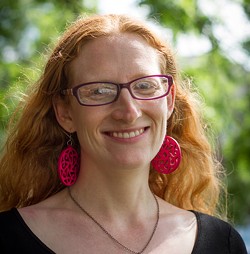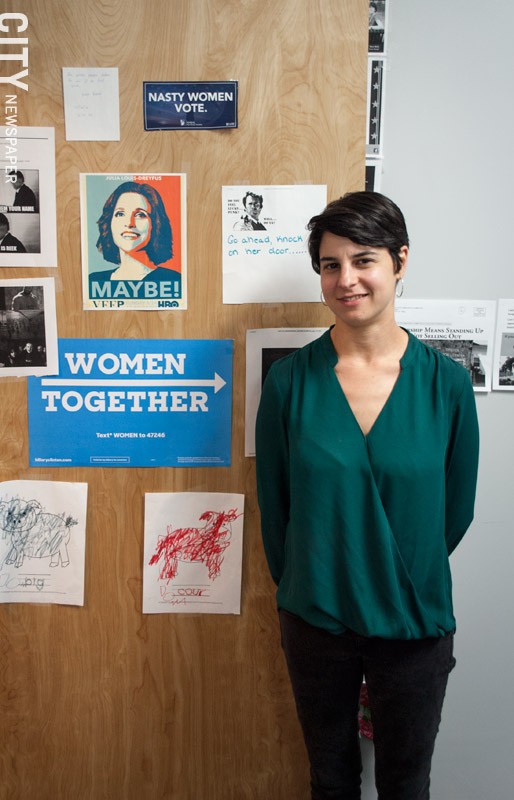Where are the women?
Social pressures, family needs, and lots more still keep women out of politics
By Tianna Mañón @TiannaManon
[
{
"name": "500x250 Ad",
"insertPoint": "5",
"component": "15667920",
"parentWrapperClass": "",
"requiredCountToDisplay": "1"
}
]
The number of American women serving in political office is nowhere near where it should be – and that number may actually be declining in some legislatures and executive offices.
"The United States is falling behind on women's representation in government," Sarah Kliff and Soo Oh write in Vox. "We have not experienced the influx of female legislators into our political system in the way dozens of other countries have."
In the House of Representatives, women make up 19 percent of the seats and in the Senate just 21 percent. Women of color are even further behind. Of the 535 members of Congress, just 7 percent are women of color. Currently, only one governor is a woman of color: Susana Martinez, the Republican governor of New Mexico.
There have been gains, of course. Since 1971, women in state legislatures have quintupled, and the number of female executives, including mayors like Rochester's Lovely Warren, has also grown, according to American politics research group Catalyst.
The City of Rochester, in fact, has quite a few women officials, in addition to Warren. Five of the nine members of City Council – including its president – and four of the seven school board members are women. The county executive and the district attorney are women.
But a woman has never served as governor of New York, and only 14 of the 63 members of the State Senate and 45 of the 150 members of the Assembly are women.
Compared with other nations, the US is 101st in female representation in public office, behind nations like Afghanistan and China. Two decades ago, we were at 52nd.
Yet 51 percent of Americans are women. With that majority, there should be more women in office. So what gives?
Traditionally, discussion about that topic has focused on overt sexism, that voters are consciously deciding to not vote for women. However, research and the experience of women politicians themselves indicate that social pressures may be a more significant factor.
In fact, some studies say that when women run for office, they're actually about as likely as men to win. The problem, some researchers say, seems to be that women simply aren't running in the first place.
Why, then, are women choosing to stay out of politics? The answer seems to come down to this: The social pressures and expectations that women face in daily life are even harsher in politics, which is an intensely demanding sphere that depends on constant civic service.
"There's nothing sexy about working in politics," jokes Nicole Hushla Re, executive director for the local chapter of WomenElect. Her organization encourages women to run for office and uses workshops and programming to teach candidates important skills like fundraising, networking, and interacting with the press.
Re is a member of the Irondequoit Town Board, and she says she probably wouldn't consider running for a higher office.
"I've worked on many congressional races," she says, "and even if you are just a junior staffer for a member of Congress, you're working 12- to 14-hour days, sometimes more. And so you know pretty early on what the candidates goes through. For right now, I'm personally in a place where I value my free time."
Also a factor: in raising a family, women are often still expected to do the heavy lifting. From the biological challenges of pregnancy to being expected to be the parent who takes time off for children's sick days and doctor's appointments, the private-sphere demands on women can really add up.
"When you run for office, it can suck up a lot of your life," says Jamie Romeo, chair of the Monroe County Democratic Committee. "You're running for a part-time seat, but running for office is still largely a full-time job."
Mary Lupien, who was a City Council candidate in the September 7 Democratic Primary, says she had to force herself to stop obsessing over things at home when she was campaigning.
"I had to let go," she says, describing how micromanaging both spheres was exhausting and was driving her crazy. Society and women themselves feed the unrealistic expectations, she adds. For many women, being able to handle it all is part of their identity.
"I think it's ingrained," Lupien says. And, she says: "It's like we're almost reluctant to let go of, because it's been part of our identity for so long."
Even when women don't want to take on roles both inside and outside the family, Lupien says, women can be "guilted into thinking they have to take them on fully," especially by other women.
Louise Slaughter, now a senior member of Congress, says that when she first entered politics running for a seat in the Monroe County Legislature, people worried that her campaign could jeopardize the care of her high-school-aged children.
"Everybody wanted to know what would happen to my children," says Slaughter. "If I went downtown one night every three weeks, and if I said I'd leave them with their father, that wasn't good enough. I promised to cook dinner before I left. People were really worried about them."
Rochester City Council President Loretta Scott is typical of the many women who postpone running for office until their children are grown. "Sometimes people want to meet at 7:30 and 8 a.m.," she says. "How can you do that if you have to get your children ready for school?"
These small needs from the private sphere add up, Scott says, meaning that women often have a more restricted schedule, impacting their ability to reach voters and spread their message.
WomenElect offered childcare for women who participated in their program, and while no one needed to take advantage of the service, "it's these kinds of things that help women," says Re. There's no point in encouraging voters to embrace women, if women are unable to run in the first place.
Re also points to issues of femininity and masculinity in politics. Traits that are traditionally those of women are often looked down upon, she says. Women, for instance, are more likely to be seen as compromising, quicker to listen than to speak, and more hesitant to boast or brag or seem authoritative, and WomenElect targets those traits in its program.
"If you're not going to represent yourself, who will?" she says.
SUNY Brockport political science professor Dena Levy agrees that perceptions about "masculine" and "feminine" traits impact women candidates, and she uses compromise as an example. "Compromise has become very bad," she says.
"Women have a much more collegial style, and I think that's often seen as weak as opposed to a strength," says Levy. And when a woman embodies a characteristic like strength, says Levy, "she is actually then considered something not very nice. It rhymes with witch."
"Women walk a fine line," says Levy. "How do you be aggressive, look like you're doing your job but not to the point that people think you're too aggressive?"
"And then you get into voice," says Levy. "'They sound shrill.' Have you ever heard a man called 'shrill'? We never call men 'shrill.'"
"We raise little boys to be assertive and go in search of what they want, and little girls to be polite and wait until they're asked," says City Council member Carolee Conklin. "We do so many things from the day they're born to assign them these 'male, female' roles."
"I don't think we have to lose our feminine traits to be effective participants in that arena," says Loretta Scott. "If we hold our ground and they look at us as equal participants even if we don't look or behave like them, then we have progress. But if we succumb, they'll never make progress for seeing people in an equal light."
"This whole 'equality' thing makes men squeamish," says Scott. "We're going to help you get used to it."
Conklin agrees. Over coffee at Spot, she gestures to her pink cardigan, the heavy necklace around her neck with pink jewels, and says: "I'll wear pink and still tell you to go fuck yourself."
Adds Jamie Romeo: If a woman has a strong sense of self and is confident when she walks into a room, "that doesn't mean you have a masculine presence. It means you have a strong presence."
Still, argues Louise Slaughter, "it's not easy for women to win," because of pure sexism.
"Women have to know more," says Slaughter. "I remember running when women would vote for me but their husbands wouldn't. I've been through the whole nine yards of it, I think, but it's tough to run for office."
"Every woman will tell you the same story," Slaughter says. "It's not just politics. We've been talking about it a lot lately. Let's say you're the only woman on a board of directors, and you're having a meeting because something critical is going on.
"All of the men attack the issues, and they all talk about it, but then the woman speaks. And there is a dance, a dynamic that takes place. They start looking at their phones or off into space, kind of daydreaming. You know they're saying, 'Let's let her speak, and then we'll talk when she's finished.'"
"I don't know any women who haven't experienced this," says Slaughter, "and it's much of the same in politics."
"Why don't more women run for office? Because it sucks" reads the headline for writer Raina Lipsitz's recent Glamour magazine article.
"After years in the field," writes Lipsitz, a former legislative director for a state assemblywoman, "I can say that yes, some of the reasons women don't run are related to their lack of confidence, as well as discomfort on the part of both candidates and voters with female ambition. But the biggest is the reason most people don't want to run for office: because it's awful, especially in a system as corrupt and compromising as ours."
"I think you don't see some of the literature we see on the campaign trail," says Nicole Hushla Re. "Just completely inappropriate in terms of putting out really unflattering pictures of women. That's a huge thing covered in social media. And things about their personal life and past. There was a sense of propriety that there isn't now."
There's nastiness on both sides, says Jamie Romeo, regardless of gender. And while Romeo says she doesn't know why women may be more susceptible to the damage, she said she believes it has a lot to do with women being more sensitive to the needs of those around them.
"I think women are more hesitant," she says. "I think the negative perspective around campaigning keeps more women out of running for office. Not necessarily because they're just thinking of the personal attack, but a lot of times, it's family, where they're thinking more about 'What if my kids see this? What if my spouse, my friends? Is that going to change their perspective on me?'"
And Loretta Scott cites another factor dissuading women from entering politics: Not seeing women in office can be demotivating.
"They don't see people that look like them," she says. "And it pushes your thinking along a negative path: 'If they're not there, maybe it's because they can't do that stuff. Not supposed to do that job. They don't fit.' You start all these negative things and don't go for it."
"When I say I think part of the problem is some of us," says Scott, "it's that old syndrome of how we stereotype even ourselves."
"I don't know whether women have a full understanding of what they are able to do in that regard," says Scott. "I don't think women think of themselves that way. I didn't. When it comes to nontraditional occupations, we used to think about things like truckers, carpentry, trades. But realistically, on some levels being a politician is a nontraditional occupation, so the same reservations and self-deselecting for those nontraditional jobs apply to politics."
Yet local offices often do have a better representation of women. That's certainly true locally, and that could be encouraging.
"These are the stepping stones to those offices," says Levy, and she adds that women typically pick local offices for obvious reasons. The issues are closer to home, the responsibilities are easier to balance with family needs, and men are less interested in those position than they are in higher seats.
"Different people use their desire to make change in different ways," says County Legislator Tanya Conley. "And so when you look at the parent-teacher association, the school board, City Council, or town board, those legislatures tend to be filled with women. I think when you get to the state legislature, which requires so much travel, I think that can be a burden on people who are invested in raising their families."
But Conley adds: "The longer we have people involved, the more likely they are to run. It does take a commitment. I think you have to reach out and find a mentor, someone who will help you along. The more women we get elected, the more will be mentors to other young candidates."
"If we pack the local electoral pipeline, these are women who in 5 to 10 years, they'll run for statewide office," says Re. "They'll run for Congress."
Serving in elected office locally lets women gain the political experience necessary for running for higher office, as Slaughter did. And it allows them to influence change right at home.
Many women hope the next generation of women will ultimately close the gap, packing seats at every level until equal representation is achieved.
And Romeo adds: Even if they don't run for office, there's a need for more women in the room, as staffers and aides.
"We have to get into the room to help make these decisions," she says.
Speaking of...
Latest in News
More by Tianna Mañón
-

Rochester artists, arts groups discuss funding options
Dec 15, 2018 -

The power of the Black Church
Jul 11, 2018 -

Bail trap: Poverty keeps thousands behind bars
Apr 11, 2018 - More »












